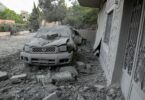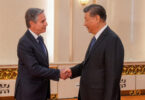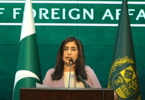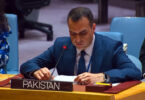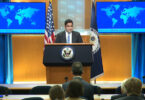Monitoring Desk
TEHRAN: Iran and the “free nations of the region” will take revenge on the United States for killing Revolutionary Guards commander Qasem Soleimani, President Hasan Rouhani said Friday.
“There is no doubt that the great nation of Iran and the other free nations of the region will take revenge for this gruesome crime from criminal America,” Rouhani said in a statement posted on the Iranian government website.
Iran supreme leader vows ‘severe revenge’
Iran’s supreme leader Ayatollah Ali Khamenei vowed “severe revenge” after the United States killed the commander of the Islamic republic’s Quds Force, General Qasem Soleimani, in Baghdad on Friday.
“Martyrdom was the reward for his ceaseless efforts in all these years,” Khamenei said on his Farsi-language Twitter account in reference to Soleimani, also declaring three days of mourning.
“With him gone, God willing, his work and his path will not be stopped, but severe revenge awaits the criminals who bloodied their foul hands with his blood and other martyrs’ in last night’s incident”.
Iran’s Revolutionary Guards confirmed Soleimani had been killed early Friday, saying he was “martyred” in an attack by US helicopters on Baghdad airport.
Soleimani was one of the most popular figures in Iran and seen as a deadly adversary by America and its allies. Khamenei called Soleimani the “international face of the resistance” and said he was killed by “the most cruel of those on earth”.
All people who back the resistance would be his “avengers”, he added. “The lack of our devoted and dear general is bitter, but continuing the fight and achieving final victory will embitter the murderers and criminals even more,” he added.
China urges ‘calm and restraint’
China on Friday appealed for restraint from all sides, “especially the United States”, after top Iranian commander Qasem Soleimani was killed in a US strike in Iraq.
“We urge the relevant sides, especially the United States, to remain calm and exercise restraint to avoid further escalating tensions,” foreign ministry spokesman Geng Shuang said at a daily press briefing.
Oil prices surge after US strike
Oil prices soared more than four percent Friday following news that the US had killed a top Iranian general, fanning fresh fears of a conflict in the crude-rich region, with Tehran warning of retaliation.
The head of Iran’s Quds Force, Qasem Soleimani, was hit in an attack on Baghdad’s international airport early Friday, according to Hashed al-Shaabi, a powerful Iraqi paramilitary force linked to Tehran.
Brent surged 4.4 per cent to $69.16 and WTI jumped 4.3 per cent to $63.84 as investors grow increasingly worried about the effects of a possible flare-up in the tinderbox Middle East on supplies of the commodity. Both contracts later pared the gains but remained well up.
“This is more than just bloodying Iran’s nose,” said AxiTrader’s Stephen Innes. “This is an aggressive show of force and an outright provocation that could trigger another Middle East war.”
The killing of Soleimani is a dramatic escalation of tensions between the United States and Iran and comes after a pro-Iran mob this week laid siege to the US embassy in Iraq following deadly American air strikes on the hardline Hashed faction.
The attack on the embassy highlighted new strains in the US-Iraqi relationship, which officials from both countries have described to AFP as the “coldest” in years.
Oil prices saw a record surge in September after attacks on two Saudi Arabian facilities briefly slashed output in the world’s top exporter by half, with Trump blaming Iran for the attack and previous other blasts on tankers in the Gulf last year.
‘A less safe world’
The crisis also comes as tensions between the US and North Korea worsen, with Kim Jong Un declaring a self-imposed moratorium on nuclear and intercontinental ballistic missile tests had ended, with US talks going nowhere.
“We are waking up to a less safe world than it was only hours ago, especially if we combine this with simmering tension in the Korean peninsula,” Innes added.
The drama sent investors rushing for the hills and safe-haven units rallied with the yen up 0.7 per cent against the dollar and gold climbing 1.4 per cent towards $1,600 and a near seven-year high.
High-risk currencies retreated against the greenback, with South Korea´s won down 0.6 per cent, Australia’s dollar off 0.4 per cent and the South African rand down more than one percent.
Equities were mixed, having been rallying for the second day of the year on China-US trade optimism. Hong Kong fell 0.3 per cent, Shanghai ended down 0.1 per cent and Singapore retreated 0.7 per cent, while Mumbai eased 0.5 per cent.
But there were gains in Sydney, Seoul, Wellington, Manila and Taipei. Regional energy firms were the big winners, with Santos surging more than two percent in Sydney and while Hong Kong-listed PetroChina climbed more than three percent.
Markets had all been well up before news of the strike, thanks to ongoing optimism fuelled by the China-US trade agreement, looser central bank monetary policies and easing Brexit worries.
“Investors are worried that the situation in Iran will worsen, since there could be some retaliation,” said Steven Leung at Mizuho Bank. “People will want to cut risk ahead of the weekend. Stocks have rallied a lot in the past month or so, so any bad news flow is a reason to take profit.”
Courtesy: (AFP)

